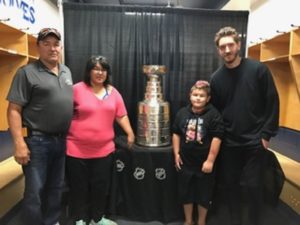Chief Peter Collins champions disabled children at AFN assembly

By Laura Robinson
VANCOUVER—There isn’t anyone who advocates more for children who are born with disabilities—both Indigenous and non-Indigenous—than Fort William Chief Peter Collins.
Chief Collins, who has been re-elected for the past 20 years, was the seconder on Chief Byron Louis’ resolution (Okanagan) entitled, “Increased Focus on Disabilities Centered on Human Rights”, which was passed at the Assembly of First Nations (AFN) Annual General Assembly in Vancouver on July 26.
“Since becoming a politician, I’ve made sure disabled children are not ever left behind,” stated Chief Collins. “I’ve spoken to Ontario’s [then] Premier Kathleen Wynne and to Prime Minister Trudeau about this. We need to create a climate of opportunities for these youth who have been disabled since birth, and they need to be part of the provincial mandate. I feel that the present youth initiatives—both in Indigenous and non-Indigenous communities, don’t address long-term disabilities. I’m talking about young people born with a disability.”
All resolutions at the AFN first cite how the United Nations Declaration on the Rights of Indigenous Peoples applies, but this resolution also cited the Convention on the Rights of Persons with Disabilities, the Canadian Charter of Rights and Freedoms and the just tabled federal Accessible Canada Act. Chief Collins believes citing all of these documents makes the case for the rights of disabled children stronger.
Chief Collins wants to see the AFN “advocate for disabilities as a central issue in all policy and program sectors” which includes working with the United Nations, and understanding disability rights as fundamental human rights.
“I’ve been chief since 1998 and all levels of government forget about the young ones with disabilities,” said Chief Collins after an Ontario chiefs meeting. “Two weeks after her birth, my daughter Angela had signs of a disability. From that day, I’ve worked on this issue. Today, she plays ball in the Special Olympics, she’s good on a computer and she wants to be part of the work force. She worked three days a week for a resource company, but they cut her back to half a day. You know these kids, they have a commitment and show responsibility sometimes that is much greater than those who can read or write. My daughter’s never been late for work.”
Today, Chief Collins is working with Resolute, the local lumber mill, to ensure the disabled have the right to work.
“We’re going to figure out a way and find a solution so they can enter the work force, but resources need to be attached to any legislation addressing disabilities.”
One of the next steps will be to establish a Regional Advisory Task Force on Disabilities, which the new Act says, will trigger funding for “regional capacity building” and will be a means to “advocate for culturally safe program and services”.
The resolution asks that “an intersectionality lens/disability analysis” be applied to the Act and the programs, policies, new initiatives and budgets attached to it can be realized, so the disabled “are not an afterthought, and nobody is left behind.” This would mean that the AFN needs to work “to ensure Federal Budget 2019 includes meaningful regionalized funding” so “a national Task Force on Disabilities” is struck “to better address the human rights of First Nations persons with disabilities who are the marginalized of the marginalized.”
The resolution also includes practical measures to meet these goals.
“Doesn’t matter to me if a child born with a disability is First Nations or non-Native. They’re all deserving of human rights,” said Chief Collins.


